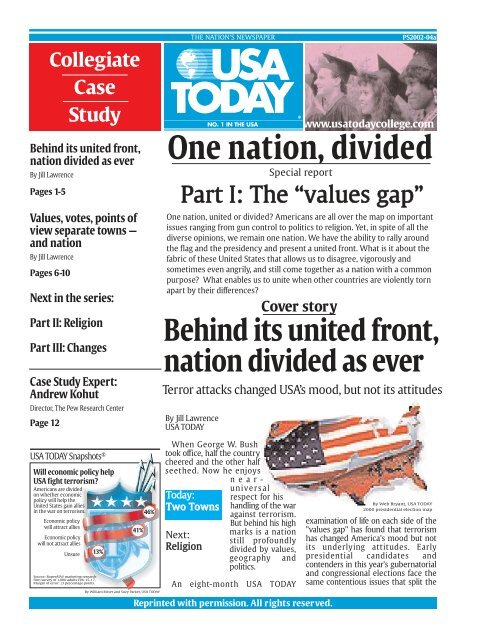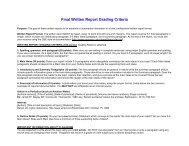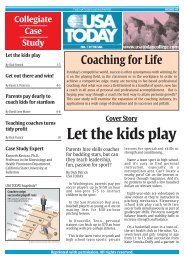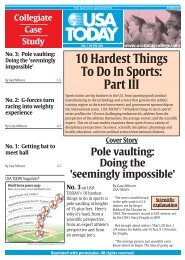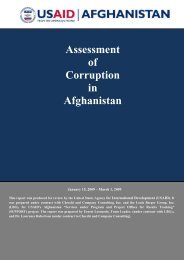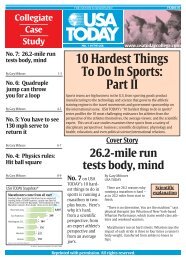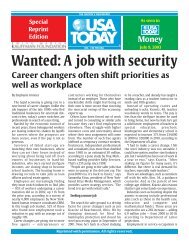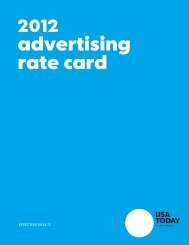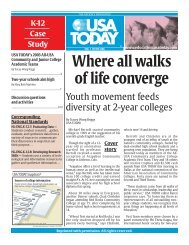One nation, divided - USA TODAY Education - K-12 Education Online
One nation, divided - USA TODAY Education - K-12 Education Online
One nation, divided - USA TODAY Education - K-12 Education Online
Create successful ePaper yourself
Turn your PDF publications into a flip-book with our unique Google optimized e-Paper software.
Collegiate<br />
Case<br />
Study<br />
THE NATION’S NEWSPAPER<br />
PS2002-04a<br />
www.usatodaycollege.com<br />
Behind its united front,<br />
<strong>nation</strong> <strong>divided</strong> as ever<br />
By Jill Lawrence<br />
Pages 1-5<br />
Values, votes, points of<br />
view separate towns —<br />
and <strong>nation</strong><br />
By Jill Lawrence<br />
Pages 6-10<br />
Next in the series:<br />
Part II: Religion<br />
Part III: Changes<br />
Case Study Expert:<br />
Andrew Kohut<br />
Director, The Pew Research Center<br />
Page <strong>12</strong><br />
<strong>One</strong> <strong>nation</strong>, <strong>divided</strong><br />
Special report<br />
Part I: The “values gap”<br />
<strong>One</strong> <strong>nation</strong>, united or <strong>divided</strong> Americans are all over the map on important<br />
issues ranging from gun control to politics to religion. Yet, in spite of all the<br />
diverse opinions, we remain one <strong>nation</strong>. We have the ability to rally around<br />
the flag and the presidency and present a united front. What is it about the<br />
fabric of these United States that allows us to disagree, vigorously and<br />
sometimes even angrily, and still come together as a <strong>nation</strong> with a common<br />
purpose What enables us to unite when other countries are violently torn<br />
apart by their differences<br />
Cover story<br />
Behind its united front,<br />
<strong>nation</strong> <strong>divided</strong> as ever<br />
Terror attacks changed <strong>USA</strong>’s mood, but not its attitudes<br />
By Jill Lawrence<br />
<strong>USA</strong> <strong>TODAY</strong><br />
<strong>USA</strong> <strong>TODAY</strong> Snapshots ®<br />
Will economic policy help<br />
<strong>USA</strong> fight terrorism<br />
Americans are <strong>divided</strong><br />
on whether economic<br />
policy will help the<br />
United States gain allies<br />
in the war on terrorism.<br />
Economic policy<br />
will attract allies<br />
Economic policy<br />
will not attract allies<br />
Unsure<br />
Source: RoperASW marketing research<br />
firm survey of 1,000 adults Feb. 15-17.<br />
Margin of error: ±3 percentage points.<br />
13%<br />
41%<br />
46%<br />
By William Risser and Suzy Parker, <strong>USA</strong> <strong>TODAY</strong><br />
Today:<br />
Two Towns<br />
Next:<br />
Religion<br />
When George W. Bush<br />
took office, half the country<br />
cheered and the other half<br />
seethed. Now he enjoys<br />
nearuniversal<br />
respect for his<br />
handling of the war<br />
against terrorism.<br />
But behind his high<br />
marks is a <strong>nation</strong><br />
still profoundly<br />
<strong>divided</strong> by values,<br />
geography and<br />
politics.<br />
An eight-month <strong>USA</strong> <strong>TODAY</strong><br />
Reprinted with permission. All rights reserved.<br />
By Web Bryant, <strong>USA</strong> <strong>TODAY</strong><br />
2000 presidential election map<br />
exami<strong>nation</strong> of life on each side of the<br />
"values gap" has found that terrorism<br />
has changed America's mood but not<br />
its underlying attitudes. Early<br />
presidential candidates and<br />
contenders in this year's gubernatorial<br />
and congressional elections face the<br />
same contentious issues that split the
AS SEEN IN <strong>USA</strong> <strong>TODAY</strong> NEWS SECTION, MONDAY, FEBRUARY 18, 2002<br />
<strong>nation</strong> in the 2000 election: religion, abortion, guns and the<br />
role of government.<br />
<strong>USA</strong> <strong>TODAY</strong> looked at the <strong>nation</strong>al "values gap" through<br />
the prism of two towns, one on each side of the split.<br />
Extensive interviews and polling in Franklin, Tenn., and<br />
Montclair, N.J., found that democracy in all its chaotic<br />
diversity is in robust health. But they also illuminated the<br />
deep divides revealed by the<br />
last presidential race.<br />
Photos by Tim Dillon, <strong>USA</strong> <strong>TODAY</strong><br />
Montclair, N.J.: Residents<br />
watch attack Sept. 11<br />
Recent polls, including a<br />
new <strong>USA</strong> <strong>TODAY</strong>/CNN/Gallup<br />
Poll, show the country<br />
remains evenly <strong>divided</strong> on<br />
politics and fractured on<br />
values issues:<br />
u Percentages of people<br />
who say they plan to vote<br />
Republican or Democratic in<br />
the elections this fall are about<br />
equal: 44% for the GOP, 42% for<br />
Democrats.<br />
u About half of Americans<br />
are satisfied and half are<br />
dissatisfied with the country's<br />
moral climate and policies on<br />
abortion and guns.<br />
u Four in 10 say they favor<br />
letting gay people form civil<br />
unions, while half oppose.<br />
"Below the veneer of unity is<br />
still a deeply <strong>divided</strong> <strong>nation</strong>,"<br />
says analyst Stuart<br />
Rothenberg, who publishes a non-partisan political<br />
newsletter. "You've got people who see the government as<br />
generally trampling on their liberties and values. You've got<br />
others who look to the government for social and economic<br />
justice and protection" from corporate abuses, pollution<br />
and gun violence.<br />
In a new political world, upended by terrorism and<br />
recession, do these differences on values still matter The<br />
answer, <strong>USA</strong> <strong>TODAY</strong> found, is yes. In extensive interviews<br />
and polls, most voters in Franklin and Montclair made it<br />
clear that they only trusted and listened to politicians who<br />
shared their values and their way of life.<br />
"Voters don't go to the polls with issue checklists,"<br />
Rothenberg agrees. "They're looking for somebody they can<br />
trust, somebody they're comfortable with."<br />
Both parties expect the 2002 elections to be very tight,<br />
and no one at this point is predicting a Bush landslide in<br />
2004. The virtual stalemate means politicians must find a<br />
way to connect with voters on both sides of the values gap.<br />
"Winning candidates at the presidential level and even at<br />
local and state levels have to draw the swing voters to their<br />
sides," says pollster Andrew Kohut, director of the nonpartisan<br />
Pew Research Center. He says that means luring<br />
them away from their natural<br />
leanings on values and party<br />
preference, which now are<br />
"dead-even."<br />
The red and the blue<br />
A color-keyed map of the<br />
2000 presidential election<br />
results showed a vast red<br />
heartland, representing<br />
counties won by Republican<br />
Bush, and patches of blue<br />
indicating the largely urban<br />
and minority counties won by<br />
Democrat Al Gore. Franklin,<br />
15 miles south of Nashville,<br />
was red. Montclair, <strong>12</strong> miles<br />
west of Manhattan, was blue.<br />
The towns are separated by<br />
750 miles, a time zone and<br />
differences that the Sept. 11<br />
attacks did not erase.<br />
Some contrasts between<br />
these two sides of America<br />
are as obvious as what people Franklin, Tenn.: Banners<br />
eat and how their<br />
reflect town’s history<br />
neighborhoods look. Others<br />
are as deep as their immutable<br />
views of sin, morality and the right to bear arms.<br />
The terrorist attacks put almost all Americans in a<br />
compassionate frame of mind and reminded them of what<br />
they love about their country. In Franklin, people are feeling<br />
more kindly toward New Yorkers. Montclair is displaying an<br />
emotional, flag-waving patriotism more often associated<br />
with the South. But, like the <strong>nation</strong>, these two towns remain<br />
polarized on the bedrock beliefs that influence political<br />
choices.<br />
Religion and guns are key predictors of those choices. Exit<br />
polls from the last presidential election found that those<br />
who go to church often and own guns tended to vote<br />
Republican; those who don't usually chose Democrats. The<br />
gap is also wide on moral issues stemming from religion.<br />
<strong>USA</strong> <strong>TODAY</strong>/Gallup Polls of Franklin and Montclair in June<br />
and November underscore those findings:<br />
Reprinted with permission. All rights reserved. Page 2
America shows a united face to the<br />
world, but divisions grow even deeper<br />
u In Franklin, 64% say they<br />
attend church or religious<br />
activities once a week or<br />
more, compared with 36% in<br />
Montclair and 42% <strong>nation</strong>ally.<br />
Nearly seven times as many<br />
people in Franklin as in<br />
Montclair own guns.<br />
u Both before and after<br />
the attacks, the towns were<br />
at least 30 percentage points<br />
apart on how they felt about<br />
gay civil rights, the death<br />
penalty, illegitimacy and the<br />
role of government. After the<br />
attacks, they grew even<br />
further apart — up to 44<br />
points — on abortion, the<br />
need for more gun control<br />
and how courts treat<br />
minorities.<br />
u Top priorities in Montclair after<br />
the attacks included health care and<br />
environmental protection. Franklin's<br />
top concerns included declining moral<br />
values.<br />
u Most in both towns called the<br />
country unified, but nearly half said<br />
Americans are "greatly <strong>divided</strong>" on<br />
values.<br />
Religion is the wellspring of the<br />
culture gap. It's at the root of<br />
opposition to abortion and<br />
homosexuality in Bush country. It<br />
influences how people view<br />
government and judge the personal<br />
behavior of public figures. It's an engine of diversity in parts<br />
of America like Montclair, where religion is often a series of<br />
open-ended discussions among people who disagree on<br />
issues as basic as whether God exists, and of conformity in<br />
areas like Franklin, a town that nourishes people who share<br />
conservative religious and cultural views.<br />
A 1999 study by the Pew Research Center found that<br />
states normally carried by Republicans in presidential<br />
elections and those normally carried by Democrats have<br />
grown further apart in the last 15 years on issues of religion,<br />
family roles and homosexuality.<br />
Photos by Tim Dillon, <strong>USA</strong> <strong>TODAY</strong><br />
In Montclair, N.J.: Dorothy McGann, left, and other gun control<br />
supporters march in the Fourth of July parade. She founded a<br />
chapter of Ceasefire New Jersey after 4 people died in a shooting<br />
at a post office in 1995.<br />
In Franklin, Tenn.: Pastors Tom<br />
Moucka, left, and Hewitt Spears, right,<br />
pray with Dan Pitts, manager of the<br />
Christian music group DC Talk, at a<br />
meeting of the Empty Hands Fellowship,<br />
an interracial minister’s group.<br />
Some analysts say the war<br />
against terrorism could<br />
spawn additional values<br />
issues that drive wedges<br />
between Americans. <strong>One</strong><br />
debate simmering now is<br />
how much to restrict civil<br />
liberties in pursuit of<br />
terrorists. Another could<br />
develop over how long to<br />
fight the war and how far to<br />
expand it.<br />
Images and tendencies<br />
Republican strategist Bill<br />
McInturff speculates,<br />
cheerfully, that a peace<br />
candidate will run in the<br />
2004 Democratic<br />
presidential primaries. He<br />
predicts both parties will revert to<br />
stereotypes they have been trying to<br />
temper in recent years — to use his<br />
words, the "kill-the-bad-guys" party<br />
(Republicans who tend to favor use of<br />
force) and the "root-cause" party<br />
(Democrats who tend to look for<br />
poverty or other underlying conditions<br />
to explain acts like terrorism).<br />
Moderate Democrats, led by Bill<br />
Clinton, toiled for years to replace the<br />
party's nurturing "mommy" image<br />
with more swagger. They promoted<br />
tough crime and welfare reforms and a<br />
muscular military. Bush, the selfdescribed<br />
compassionate conservative,<br />
highlighted education and tolerance in<br />
2000 in trying to warm up the GOP's<br />
coldly authoritarian "daddy" image. Polls indicate Bush is<br />
succeeding, but Democrats are losing ground they gained<br />
during the Clinton era.<br />
Democratic strategists Stan Greenberg, James Carville and<br />
Bob Shrum say the Sept. 11 attacks create "a moment of<br />
opportunity for Democrats." In a memo posted on the<br />
Internet, they hint that America's fundamentalist Christians<br />
may feel the same discomfort as Afghanistan's Taliban<br />
fundamentalists with "the life choices and gender roles at<br />
the center of American life."<br />
Page 3
Ed Goeas, a Republican pollster and<br />
strategist, calls that idea "Christianbashing."<br />
"They directly compare<br />
fundamentalist Christians, or<br />
conservative Christians, with<br />
fundamentalist Muslims," Goeas says.<br />
"The implication is very clear that there<br />
is a religious intolerance. They're<br />
attempting to demonize those people<br />
of faith that happen to be conservative.<br />
They're basically advocating restarting<br />
the culture wars."<br />
Greenberg says "the Taliban have<br />
given a bad name to fundamentalism . .<br />
. in a political guise." He says he is not<br />
criticizing fundamentalist Christians<br />
but "political entrepreneurs who try to<br />
bring a religious fundamentalism into<br />
politics" and impose their beliefs.<br />
This is the kind of conversation some<br />
Democrats desperately want to avoid.<br />
They are trying to make religious,<br />
socially conservative Americans in<br />
areas like Franklin feel more welcome<br />
in their party.<br />
"We have to be more comfortable<br />
with the language of faith and values"<br />
and address "broad unease with the<br />
moral health of the country," Sen. Joe<br />
Lieberman, D-Conn., an Orthodox Jew<br />
and a 2004 presidential prospect, said<br />
at a party gathering last summer.<br />
Democratic Party leaders have<br />
launched a rural outreach program that<br />
chairman Terry McAuliffe calls a top<br />
priority. The Republican Party,<br />
meanwhile, is intensively courting<br />
Hispanic voters, and some GOP<br />
candidates are trying to make inroads<br />
in the black community, which votes<br />
overwhelmingly Democratic.<br />
Both parties know values issues can<br />
be critical in closely <strong>divided</strong> states.<br />
Many analysts say Gore narrowly lost<br />
West Virginia and his native Tennessee<br />
— and with them, the presidency —<br />
because he was perceived as anti-gun.<br />
Democrats call guns a threshold or<br />
gatekeeper issue that determines<br />
whether voters listen to their<br />
candidates talk about jobs, education<br />
and other subjects.<br />
"Rural voters just shut us down if<br />
they don't agree with us on guns," says<br />
Joe Carmichael, chairman of the<br />
Missouri Democratic Party. "We lose<br />
them around the first turn of the<br />
corner."<br />
In his race for Virginia governor last<br />
year, Democrat Mark Warner showed<br />
his party how to overcome cultural<br />
differences. Republicans reminded<br />
voters their candidate opposed<br />
abortion. They said Warner believed<br />
"people of faith" are "a threat to<br />
America." But Warner had courted<br />
rural Virginia with a bluegrass<br />
campaign jingle and support for gunowner<br />
rights. He won trust, the chance<br />
to sell his economic plans, and the<br />
election.<br />
Lessons for 2004<br />
In the 2000 presidential race, Bush<br />
and Gore each had trouble winning<br />
trust outside his own party base. Much<br />
of Middle America did not believe Gore<br />
shared its values, polls and interviews<br />
show, and urban America felt the same<br />
about Bush.<br />
As recently as August, when Bush<br />
returned from a month at his Texas<br />
ranch, The Washington Post editorial<br />
board noted acerbically that he had<br />
spent his vacation "celebrating the<br />
values of the Heartland, in not so<br />
implicit contrast with our own. . . .<br />
Those values, he repeated this week,<br />
include 'family and faith,'<br />
'neighborliness,' 'the willingness of<br />
people to help each other in need.'<br />
Which means that we Washingtonians<br />
stand for — what, exactly"<br />
Less than two weeks later,<br />
Washington and New York were<br />
attacked, and Bush abruptly became<br />
everyone's president.<br />
The feel-good unity could sweep him<br />
to re-election in 2004, or it could<br />
splinter. Some Republicans are talking<br />
about turning out evangelical<br />
Christians to ensure that Bush wins the<br />
A ‘values gap’<br />
Polls of residents in Franklin,<br />
Tenn., and Montclair, N.J. show<br />
markedly different views:<br />
Montclair<br />
Franklin<br />
Nationally<br />
Do you think current gun laws<br />
need to be more strictly<br />
enforced, or should new gun<br />
laws be passed in addition to<br />
enforcing current ones<br />
Enforce current laws<br />
June 28%<br />
November 28%<br />
June<br />
November<br />
Pass new laws<br />
How often do you attend<br />
religious-related activities<br />
Once a week or more<br />
36%<br />
64%<br />
42%<br />
40%<br />
31%<br />
38%<br />
56%<br />
67%<br />
60%<br />
70%<br />
67%<br />
Less than once a month or<br />
never<br />
46%<br />
22%<br />
38%<br />
June<br />
November<br />
June<br />
November<br />
Source: For Montclair and Franklin,<br />
<strong>USA</strong> <strong>TODAY</strong>/Gallup Polls of 400 adults<br />
June 22-28, 2001, and 405 adults Nov.<br />
9-15, 2001. Both have a margin of<br />
error of +5 percentage points. For<br />
<strong>nation</strong>al figures, a <strong>USA</strong><br />
<strong>TODAY</strong>/CNN/Gallup Poll of 1,001 adults<br />
Feb. 8-10, 2002, which has a margin of<br />
error +3 percentage points<br />
Page 4
popular vote. He lost it last time by a halfmillion<br />
votes as several million evangelicals<br />
stayed home. Bush could motivate them<br />
by stressing his faith and opposition to<br />
abortion. But that could undercut his<br />
attempts to win voters and states he lost<br />
last time.<br />
For political leaders, there's always<br />
tension between stressing controversial<br />
values issues to fire up believers and<br />
defusing them in an attempt to win<br />
broader support. In his State of the Union<br />
address, watched on TV by millions, Bush<br />
dwelled on unifying themes and reached<br />
across the divide.<br />
He talked at length about the war on<br />
terrorism that nearly all Americans<br />
support. He mentioned "my friend Ted<br />
Kennedy" and his work with the liberal<br />
Massachusetts senator on education, an<br />
issue the whole country holds dear. And<br />
Bush highlighted values championed by<br />
moderates and liberals, including respect<br />
for women and religious tolerance.<br />
Democrats eyeing Bush's job are doing<br />
some outreach of their own.<br />
Gore will tour the country with his wife<br />
this year to promote their books on<br />
American families -- demonstrating his<br />
own family values in the process. His 2000<br />
running mate, Lieberman, is advancing<br />
ideas that reinforce his identity as a<br />
devout, hawkish politician who thinks<br />
Hollywood sometimes overdoes sex and<br />
violence. Senate Majority Leader Tom<br />
Daschle and House Minority Leader<br />
Richard Gephardt say their values are<br />
reflected in their push for expanded<br />
jobless benefits, a higher minimum wage<br />
and prescription-drug aid for seniors on<br />
Medicare.<br />
Third-term Sen. John Kerry, D-Mass., has<br />
ready ammunition should anyone think he<br />
or his state is too liberal. Ronald Reagan<br />
carried Massachusetts twice, he notes, and<br />
its property tax revolt was the second in<br />
the country, right behind California's.<br />
Kerry is a decorated Vietnam veteran and<br />
a former prosecutor who describes his<br />
record as tough on crime, welfare and<br />
federal spending.<br />
Another potential candidate, freshman<br />
Sen. John Edwards, D-N.C., grew up<br />
around guns, religion and small-town<br />
Southern values. He says voters want their<br />
leaders to be good spouses and parents<br />
and "people of faith," and to show<br />
understanding of — if not agreement with<br />
— their views on guns, abortion and other<br />
values issues. "The way you talk about<br />
these things matters," Edwards says.<br />
Even as polls show the public continuing<br />
to rally behind Bush and the war against<br />
terrorism, values issues are back on the<br />
campaign trail. Shifting candidate positions<br />
on abortion and gun control — and the<br />
issues of trust that such shifts raise — are<br />
front and center in contests for governor in<br />
California and senator in North Carolina.<br />
"If you think these values issues are<br />
unimportant, just watch the midterm<br />
races," says Democrat Will Marshall, head<br />
of the centrist Progressive Policy Institute.<br />
"Plenty of Republicans will try to make<br />
gun control an issue. Plenty of Democrats<br />
will try to make choice (on abortion) an<br />
issue. We're going to have the same kinds<br />
of divides."<br />
Page 5
AS SEEN IN <strong>USA</strong> <strong>TODAY</strong> NEWS SECTION, MONDAY, FEBRUARY 18, 2002<br />
Photos by Tim Dillon, <strong>USA</strong> <strong>TODAY</strong><br />
Connected to the big-city lifestyle: Commuters to Manhattan wait at one of the six train stations in Montclair, N.J., a suburb <strong>12</strong><br />
miles west of New York City. Trees will be planted at all six Montclair stations — and at other stations in New Jersey — in honor of<br />
those who died in the terrorist attacks of Sept. 11. Seven Montclair residents were among the dead.<br />
Values, votes, points of view<br />
separate towns — and <strong>nation</strong><br />
By Jill Lawrence<br />
<strong>USA</strong> <strong>TODAY</strong><br />
If you voted for President Bush in 2000,<br />
you might well live in a place like<br />
Franklin, Tenn., a sprawling Sun Belt<br />
suburb with a distinct Bible Belt flavor.<br />
Its horse and dairy farms are giving way<br />
to subdivisions and strip malls, but its<br />
values remain rooted in tradition.<br />
Donna Reed and Fred MacMurray would have seemed<br />
right at home in Montclair, N.J., where street after street is<br />
lined with big shade trees, well-tended gardens and<br />
perfectly painted Victorian and Tudor homes. But the<br />
1950s look belies an urban sensibility that was the<br />
common denominator among people who voted for Al<br />
Gore in 2000.<br />
Red zone meets blue zone.<br />
McGavock Confederate Cemetery: The <strong>nation</strong>'s largest private<br />
Confederate cemetery sits beside Historic Carnton<br />
Plantation in Franklin. Janet Booker-Davis, a black accountant,<br />
says she planned to act as a one-woman truth squad when<br />
her daughter visited the plantation on a field trip sponsored<br />
by her school. But the guide "gave a balanced view," Booker-<br />
Davis says. She adds: "I enjoyed it."<br />
Post-election analysis revealed an America split by<br />
conflicting core beliefs on guns, abortion, the role of<br />
religion and the role of government. But it's not only heavy<br />
ideology that divides us.<br />
Page 6
How people deal with problems and with each other,<br />
what they eat, wear and listen to, how they conduct their<br />
public life, even how their towns look — all of it varies<br />
according to whether you live amid Republican red or<br />
Democratic blue on the political map.<br />
Dip into the differences and it's easy to see why in 2000,<br />
with no overarching issue like war or recession, two-thirds<br />
of Franklin voted for Bush and three-quarters of Montclair<br />
voted for Gore. Like the two Americas they mirror, each<br />
felt comfortable about one man and uneasy about the<br />
other.<br />
Confederate soldier towers 44 feet over the Public Square, a<br />
marble symbol of pride and loss. The 1864 Battle of<br />
Franklin devastated the town and sent it into a deep sleep<br />
for a century.<br />
As recently as 1980, Franklin was "dead on the vine. The<br />
monetary powers that be had kept out change," says<br />
Hewitt Sawyers, a black pastor who grew up in the area,<br />
left for college and a career, then came home.<br />
Since then, Franklin has more than made up for lost time.<br />
Its population doubled from 1980 to 1990 and again from<br />
1990 to 2000. Latest official estimates: nearly 42,000<br />
people and 32 square miles. Both numbers increase<br />
continually as newcomers arrive and the city annexes<br />
more land.<br />
Along with farms, subdivisions and an upscale mall,<br />
Franklin boasts 100 health-care companies and<br />
headquarters or divisional operations for 14 major <strong>nation</strong>al<br />
corporations. The Christian music industry relocated from<br />
Nashville. The Gospel Music Association is looking for land.<br />
The association's president, Frank Breeden, says Franklin<br />
is popular for good reason: "The lifestyle is at that stage<br />
where it's still idyllic. There's a small-town feel. It's almost a<br />
return to the social and civic values of life in the '50s."<br />
Bush was a reserved candidate whose watchwords were<br />
civility, compassion and honor. He embodied tradition in<br />
family and religion, ran with discipline, kept his private life<br />
private and pledged to be a good role model. Those are all<br />
paramount values in Franklin.<br />
Gore was a talky candidate who believed in hashing<br />
things out, and he put his own family traumas on the<br />
record. He was brainy and intellectual and had a resume a<br />
mile long. He championed diversity and embodied<br />
competence. And those are paramount values in Montclair.<br />
Old meets new in Franklin<br />
Photos by Tim Dillon, <strong>USA</strong> <strong>TODAY</strong><br />
An urban smorgasbord: Watchung Plaza, one of several small<br />
commercial strips in Montclair, offers bagels, takeout Chinese,<br />
upscale Italian, liquor, jewelry and gourmet coffee.<br />
Franklin, south of Nashville, typifies the explosive growth<br />
of Republican-leaning suburbs across the South and West,<br />
even as it tries to preserve a 203-year past. Main Street is<br />
lined with historic brick buildings and shops with such<br />
names as Pigg & Peach and Heart and Hands. A<br />
Franklin is a magnet for people with conservative<br />
worldviews. It's home to the Middle Tennessee Home<br />
<strong>Education</strong> Association for home-schoolers and Christian<br />
World Broadcasting, which produces Christian<br />
programming in Russian and Chinese and beams it to those<br />
countries from a tower in Alaska.<br />
The new Williamson Christian College is based there, as<br />
is the Tennessee League of the South.<br />
David O. Jones founded and chairs the 400-member<br />
league, which demands "an end to federal tyranny" and "a<br />
return to Biblical morality."<br />
An Illinois native, Jones says a Southerner is "one who<br />
holds religion as a significant factor in life; who considers<br />
family as the central unit in society, family and property as<br />
their personal domain and self-reliance as a basic principle<br />
of government." He could be describing his neighbors.<br />
Franklin's hallmark is a veneer of Southern graciousness.<br />
Much is left unsaid, and privacy is prized. Families stick<br />
close to home in neighborhoods they compare to movie<br />
fantasies, complete with horse fences and soda shops. The<br />
line between personal and public life is clearly drawn. It's a<br />
town where gays remain in the closet, race relations go<br />
largely undiscussed and a PTA president declines to be<br />
interviewed about her school.<br />
Page 7
Photos by Tim Dillon, <strong>USA</strong> <strong>TODAY</strong><br />
Embracing the small-town ways: Bill Harlin, 77, with Coins in a Row, a champion Tennessee walking horse, at Harlinsdale Farm less<br />
than a mile from the town square in Franklin, Tenn. He’d like to keep his 200-acre farm out of developers’ hands. “They see farmland<br />
as wasteland,” he says.<br />
Ginette Gallauresi, a Spanish translator for the school<br />
system, calls the town "one lovely place to live."<br />
Nevertheless, she was surprised at the reserve she<br />
encountered when she moved there four years ago. "They<br />
have this wonderful Southern hospitality, but they are not<br />
very open to welcome you," she says. "There is a wall there.<br />
I think they need a little time to get to know you."<br />
James-Ben Stockton, co-owner of the James-Ben Gallery,<br />
likes Franklin's mix of small-town neighborly and keep-toyourself.<br />
When he had the flu, he says, nearby merchants<br />
offered to bring soup and buy groceries.<br />
"There's an awareness of each other without being<br />
horribly intrusive," he says. "That's a magic combi<strong>nation</strong> to<br />
me."<br />
City life in Montclair<br />
Just 6 square miles, Montclair fancies itself no ordinary<br />
suburb. It bustles with <strong>12</strong> movie theaters, three theater<br />
companies, two jazz clubs, an art museum, a state<br />
university and a museum honoring longtime resident Yogi<br />
Berra. Unique shops and restaurants greatly outnumber<br />
chain stores. This town of 39,000 people likes its coffee at<br />
the Bluestone Cafe, its Asian food at Taro, its Thai at Tuptim,<br />
its Italian to a backdrop of opera at Palazzo.<br />
Diversity heightens Montclair's urban feel. It's one-third<br />
black, welcoming to gay and interracial couples and home<br />
to thousands of artists, writers, actors and musicians. The<br />
typical path is: You're a hip sophisticate on Manhattan's<br />
Upper West Side, you move to Brooklyn for space, then you<br />
have kids and move to Montclair for the schools.<br />
And it feels like the city, teeming with energy and<br />
interaction. People spill out of their homes for church,<br />
school, civic and political meetings, Scrabble, writing and<br />
book clubs, neighborhood stock investment clubs, concerts<br />
of mandolin or jazz bassoon.<br />
Montclair has its own gun-control, abortion rights and<br />
anti-war groups, its own chapters of Amnesty Inter<strong>nation</strong>al<br />
and the NAACP.<br />
The Council for Secular Humanism recently opened a<br />
"faith-free" Center for Inquiry downtown, its fourth in the<br />
country. The group holds discussions on subjects you don't<br />
hear about much in Franklin, such as "Bible Relevancy: A<br />
Debate."<br />
Sharing opinions is a civic duty. That makes for long<br />
debates and occasional rancor.<br />
"Many people who come to Montclair want to be heard,<br />
known, flex a sense of who they are," says the Rev. Robert<br />
Schiesler of St. Luke's Episcopal Church.<br />
"That invites a clash," he says.<br />
Page 8
Tenor tells much<br />
about towns<br />
when word traveled that rich people there needed<br />
household help. Blacks made good livings but encountered<br />
prejudice. They were blocked from buying homes in tony<br />
"upper Montclair" until Fred Goode and his family crossed<br />
the color line in 1964. Black schools were shortchanged<br />
until state and local pressure forced integration in 1976.<br />
Photos by Tim Dillon, <strong>USA</strong> <strong>TODAY</strong><br />
Diversity: Ron and Carol Burton, right, watch the July Fourth parade in<br />
Montclair. With them are their son and daughter, Ron’s sister and her husband,<br />
and his mother, a lifelong Montclair resident. Montclair runs a program that<br />
convenes groups to discuss racial issues.<br />
Development: Subdivisions are spreading in<br />
Franklin, whose population doubled in the ’90s.<br />
Bob Russo says his job as supervisor of the state lemonlaw<br />
office makes him perfect for his part-time job as mayor.<br />
"I'm a professional complaint-handler," he says. "I think<br />
this is the town for me."<br />
Complaints about curbs, trees and garbage will never stop,<br />
he says, but since Sept. 11, larger issues are foremost:<br />
protecting against anthrax and other threats, planning<br />
permanent memorials to the seven town residents who<br />
died in the attacks and setting up a Hometown Fund for the<br />
dozen children who lost their fathers.<br />
Race relations<br />
Matters of race have preoccupied both Franklin and<br />
Montclair throughout their histories. And there is no more<br />
clear-cut example of their differences than the way they<br />
handle race.<br />
Blacks have lived in Montclair since just after the Civil War,<br />
Today, many of Montclair's black residents hold highpaying<br />
jobs in finance, law, business or the arts. Interracial<br />
marriages and adoptions are common. In a <strong>USA</strong><br />
<strong>TODAY</strong>/Gallup Poll, 42% said their neighborhoods are halfwhite,<br />
half-black. The town has its own civil rights<br />
commission and affirmative action plan. Problems are aired<br />
in classic Montclair style.<br />
Educators unleashed a raw, even racist dialogue nine years<br />
ago when they proposed a single ninth-grade English<br />
curriculum, rather than classes tracked according to ability.<br />
Some white parents suggested less prepared black students<br />
would hold back their kids.<br />
"Every public meeting was an attack," Montclair High<br />
School Principal Elaine Davis recalls. "There was no trust. It<br />
was accusations. They would call each other names. It was<br />
difficult to see."<br />
More often, Montclair's openness is constructive. For<br />
instance, the town runs an innovative "conversations on<br />
Page 9
ace" program that convenes small interracial groups to talk<br />
about racial issues. More than 500 people have argued,<br />
learned and made new friends since the sessions began in<br />
1998.<br />
Parents of both races say they like the values their kids<br />
learn in Montclair. Alison Barnett, a former town council<br />
member, recalls her daughter's seventh-grade crush on a<br />
boy named Jason: "We picked him up to go to a dance, and<br />
he was black. I couldn't say 'Emma, you didn't tell me he<br />
was black.' It's been good for me."<br />
As much as Montclair talks about race, Franklin buries the<br />
subject. The town had more blacks than whites at the time<br />
of the Civil War. They were plantation slaves. By 1990,<br />
Franklin was only 14% black, and in 2000, as whites flooded<br />
into the area, the black population was down to 10%.<br />
Twice as many people in Franklin as in Montclair —58% vs.<br />
29% —say minorities have equal job opportunities with<br />
whites, the <strong>USA</strong> <strong>TODAY</strong> poll found. But the poorest<br />
neighborhoods in Franklin are black and Hispanic. The black<br />
middle class is small, and black-owned businesses are<br />
nearly non-existent. Stereotyping is a problem.<br />
Chris Williamson, a fundamentalist black pastor, is built<br />
like a football player. At restaurants and golf clubs, people<br />
often ask him whether he plays for the Tennessee Titans.<br />
"I'm a preacher," he tells them. Privately, he wishes they'd<br />
ask whether he is a doctor, lawyer or teacher.<br />
Race relations have been mostly quiet, says county<br />
historian Rick Warwick, author of Williamson County in<br />
Black and White. "All business was controlled by a few<br />
families. Blacks couldn't afford to raise any protests because<br />
they wouldn't be able to work," he says.<br />
Black students even gave money to build the Confederate<br />
statue in 1899. More than a century later, County<br />
Commissioner Mary Mills, a retired school principal who is<br />
black, says she deals with it by averting her eyes. "I look at<br />
the flowers," she says. "There's so much beauty on the<br />
square. Why do I need to look up"<br />
Changes are coming. Blacks are slowly moving into<br />
elected and appointed jobs, including county schools<br />
director. Spanish-speaking students are flooding schools as<br />
their fathers fill jobs on landscape and construction crews.<br />
Williamson's Strong Tower Bible Church is integrated, as is<br />
dentist Felix Lawrence's practice.<br />
The only routine "conversation on race" in Franklin is<br />
taking place among several dozen evangelical pastors.<br />
Usually they meet for prayers and presentations. But at the<br />
time of the 2000 election, the topic was politics. Why, the<br />
white pastors asked the black ones, do devout black<br />
Christians keep voting en masse for Democrats who<br />
support abortion and gay rights and in many cases aren't<br />
even born-again<br />
The black pastors were blunt. Some things are more<br />
important than gay rights and abortion, they said — such as<br />
being able to feed and educate your kids. Blacks believe the<br />
Republican Party is for the elite, they said, and will never<br />
care about the poor.<br />
Bush tried harder than many Republicans to crack the<br />
black vote in 2000 but won less than 10% of it. The factors<br />
that predict whites' political choices — where people live,<br />
whether they attend church, their levels of income and<br />
education — often do not apply.<br />
As Janet Booker-Davis, a black accountant in Franklin, put<br />
it: "It doesn't matter how much money you have. You're<br />
still black." That is, you're still concerned about<br />
practicalities: jobs, education and discrimi<strong>nation</strong>. If you're<br />
doing well, you worry about those who aren't.<br />
Franklin's black pastors offered their white brethren a<br />
glimpse into a world in which conservative religious values<br />
do not dictate political choices. Scotty Smith, pastor of<br />
Christ Community Church, says he and his white colleagues<br />
emerged "redemptively humbled." The main casualty, he<br />
says, was their notion that "any thinking Christian is going<br />
to vote Republican."<br />
Page 10
Jill Lawrence<br />
Politics reporter,<br />
<strong>USA</strong> <strong>TODAY</strong><br />
a little slice of city in the suburbs.<br />
Behind the Story: A Reporter’s Notebook<br />
I got the idea for this series from the exit polls after the 2000 election. The country was<br />
<strong>divided</strong> equally between the two presidential candidates, and you could almost predict<br />
who voted for Bush and Gore by a few key characteristics — among them where they<br />
lived, what they thought about guns, and how often they went to church. I wondered<br />
how different people and communities would seem up close. I thought it would be<br />
interesting to get to know a community on each side of the divide and in effect introduce<br />
one half of America to the other.<br />
Some of the hardest work came in the next couple of months as we looked for communities<br />
that reflected the two Americas. I spent a lot of time on the Internet, looking at<br />
Census and marketing data. I settled on Franklin, Tenn., as a Bush town because of its<br />
good mix of economic and religious conservatives and Montclair, N.J., as a Gore town —<br />
I didn’t know anyone in either place, but I was able to find natural networkers — real estate types, school<br />
publicists, pastors — to introduce me around. I went to all kinds of meetings and got to know lots of people.<br />
It was harder in Franklin than in Montclair, just because people are more reserved there. But in the end it<br />
worked out. We also polled each community to confirm the differences in attitudes.<br />
I was in Montclair on my final day of research (on what by then was an eight-month project), when the photographer’s<br />
pager went off. The World Trade Center had been hit by a plane. We raced up the mountain above<br />
Montclair to see the smoking skyline and watched both towers fall. I remember thinking, ‘that’s the end of a<br />
<strong>nation</strong> <strong>divided</strong>.’<br />
But in the next couple of weeks, we realized we had the makings of a terrific revised project. Since we had<br />
baseline data, we could now go back to our communities and see if the Sept. 11 attacks had caused any fundamental<br />
changes in political and cultural attitudes. The result: the three-part series “<strong>One</strong> Nation, Divided.”<br />
<strong>One</strong> of the most interesting aspects of the project was its aftermath. The Franklin business community did<br />
not like the depiction of Franklin as a religious town with conservative attitudes on social issues and the<br />
racial issues linked to its Civil War heritage. There was a great hue and cry in the Franklin and Nashville<br />
newspapers, but many observers and analysts felt the town had been captured accurately. Montclair was<br />
depicted as a confrontational place where people think they’re religious but they’re actually not, and the<br />
town’s collective preoccupation with race can sometimes turn ugly. But nobody in Montclair complained. In<br />
fact they recognized and approved of the way their town was portrayed.<br />
Jill Lawrence is a political writer at <strong>USA</strong> <strong>TODAY</strong>. Prior to joining the paper in 1996, she was a columnist for<br />
The Associated Press and a free-lance magazine and newspaper writer. She has covered every presidential<br />
campaign since 1988. She won a National Headliner Award for her AP columns in 1995 and taught journalism<br />
at American University in 1997.<br />
Jill received a music history degree from the University of Michigan in 1975 and a masters degree in journalism<br />
from New York University in 1976. She started her journalism career with UPI in Charleston, W.Va.,<br />
where she covered coal, floods, politics, triple-A baseball and the state legislature. She joined AP in<br />
Harrisburg, Pa., in 1979 and became the primary reporter on the Three Mile Island nuclear accident. She<br />
moved to Washington with AP in 1982.<br />
She lives in Washington, D.C., with her two sons and her husband, John Martin.<br />
Page 11
For discussion<br />
Future<br />
implications<br />
1. Think about the community you live in or the one you grew up in. Does it have<br />
more in common with Franklin, Tenn. or Montclair, N.J. In what ways<br />
2. Jill Lawrence’s article states that "Religion is the wellspring of the culture gap." The<br />
political map shows strong support for Gore in the northeast and west coast, while<br />
most of the "middle" of the country supported Bush. Are there other important<br />
factors besides religion that you think causes the map to look this way<br />
3. In a Pew Research Center poll conducted in March, most Americans said there is<br />
either the right amount (54%) or too little (24%) expression of religious faith and<br />
prayer by political leaders, while just 16% thought there is too much. What are your<br />
views on whether political leaders should refer to religion, faith and prayer when<br />
they are speaking to the American public<br />
4. According to these articles, many candidates from both the right and the left have<br />
found that expressing their own religious faith publicly is a good way to establish<br />
trust among voters. Can you think of a recent example of a political leader or<br />
candidate referring to their own religious faith or beliefs What was your reaction<br />
5. Why do you think guns are such a divisive issue in American society and politics<br />
Do you think, as a result of the terrorist attacks, this issue will become less of a<br />
dividing line or more of one Why<br />
6. In describing the "Cultural Divide" in America, a lot of attention is paid to the<br />
differences between cities like Franklin, Tenn. and Montclair N.J. Are there other<br />
values which Americans tend to share, regardless of where they live Are there views<br />
Americans hold that set them apart from citizens of most other countries<br />
1. Stuart Rothenberg says "Below the<br />
veneer of unity is still a deeply <strong>divided</strong><br />
<strong>nation</strong>." Over the next twenty years, do<br />
you think America will remain largely<br />
unified, or will the cultural divide grow<br />
deeper over time Explain.<br />
2. Recent elections and polls suggest<br />
that there are about the same<br />
number of people on each side of the<br />
"Culture Divide," leading to closely<br />
contested presidential elections and a<br />
closely <strong>divided</strong> Congress. Over the<br />
next 20 years, do you think one side<br />
of this culture divide will become<br />
more dominant If so, why<br />
3. Based on the actions and personal<br />
lives of recent political leaders, do you<br />
think that the values gap will have<br />
more or less of an impact on future<br />
presidential elections Explain how<br />
future electoral maps will compare to<br />
the one from 2000.<br />
About The Expert<br />
Andrew Kohut is Director of the Pew Research Center for The People & The Press in Washington,<br />
DC. Kohut was President of The Gallup Organization from 1979 to 1989. In 1989, he founded<br />
Princeton Survey Research Associates, an attitude and opinion research firm specializing in<br />
media, politics and public policy studies. Kohut is a press commentator on the meaning and<br />
interpretation of opinion poll results. In recent <strong>nation</strong>al elections he has served as a public<br />
opinion consultant and analyst for National Public Radio. Kohut has been a regular contributor to<br />
the NewsHour with Jim Lehrer. He has written widely about public opinion for leading<br />
newspapers and magazines, as well as for scholarly journals. Kohut has co-authored three books:<br />
"The Diminishing Divide," "The People, The Press and Politics" and "Estranged Friends The<br />
Transatlantic Consequences of Societal Change." Kohut received an A.B. degree from Seton Hall<br />
University and studied graduate sociology at Rutgers.<br />
Additional resources<br />
The Pew Research Center for the People and the Press<br />
http://people-press.com<br />
For more information, log on to http://www.usatodaycollege.com<br />
Page <strong>12</strong>


